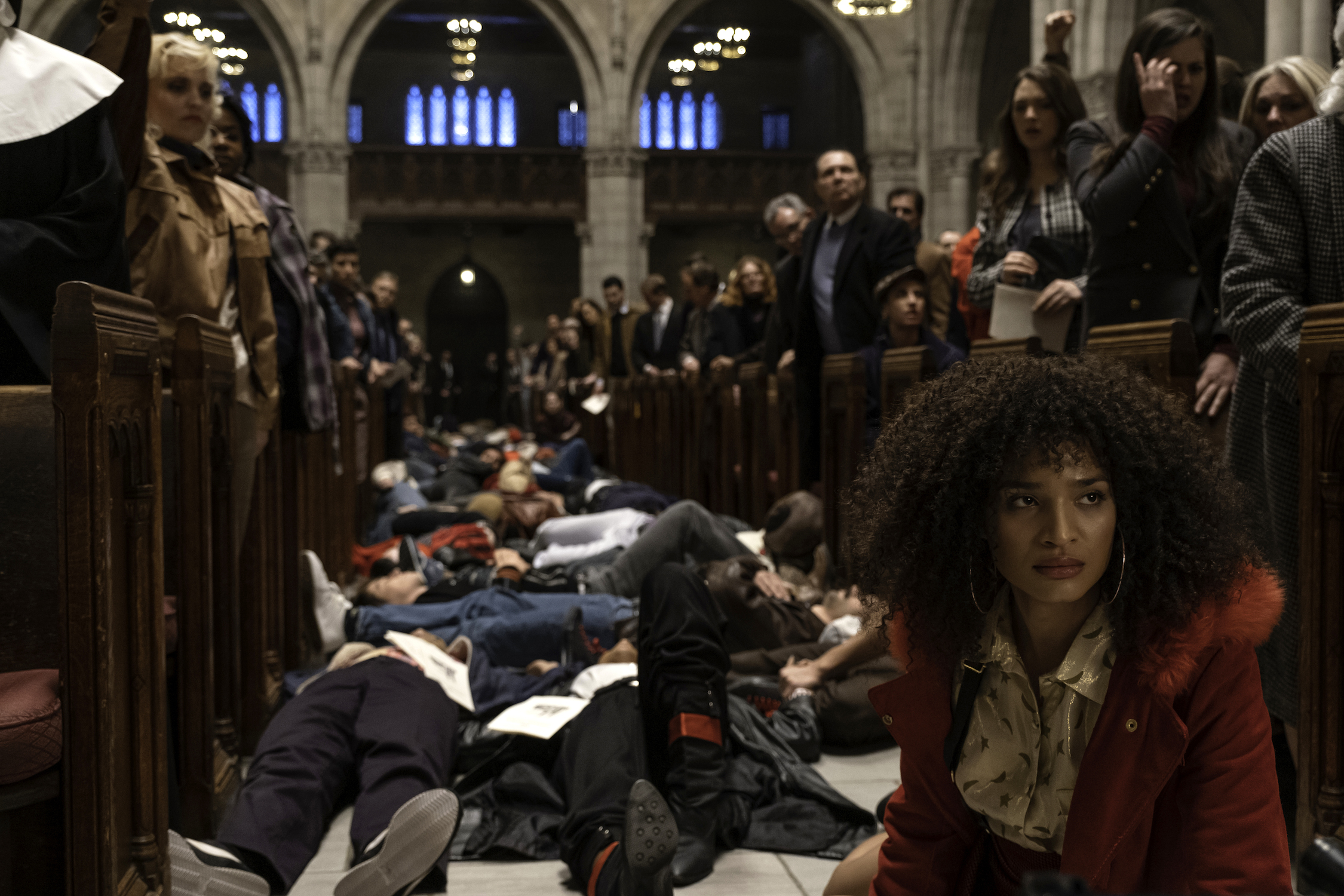“We are on the cusp of a revolution.” So says Blanca (MJ Rodriguez) to her House of Evangelista in the second season premiere of Pose. It is now 1990 and Madonna’s “Vogue,” a song all about ball culture is everywhere. For Blanca, who’s taken in a slew of queer and trans kids from the streets of New York and given them a home, Madonna’s celebration of their subculture hints at a bigger shift. Maybe Angel (Indya Moore) could be discovered as the model Lil Papi (Angel Bismark Curiel) knows her to be. Maybe Blanca and Pray Tell (Billy Porter) will find a way to not just survive their HIV+ diagnoses but inspire their younger counterparts to join in the radical activism of ACT UP. But as with any revolution, this one won’t come quickly, won’t come easily, and it certainly won’t come without its costs.
The first episode of the second season may want to put Madonna’s game-changing hit in context, giving us access to the very young dancers that influenced her iconic song, but it’s just as interested in tracing the way the AIDS epidemic is further decimating an entire generation. The opening scene, in fact, takes place on Hart Island, whose massive public cemetery became a dumping ground for those who died from the disease and were not claimed by family. As Blanca and Pray Tell look on at the mass graves being assembled, audiences are reminded that the glittering world of the balls existed hand in hand in the early 90s with the stench of death and decay. It’s why these parental figures — she, motherly and kind; he, assertive and imposing — are committed to the radical activism of the era. Later in the episode, the two join Angel and ACT UP at a die-in in a church, where they lay themselves down as protest against the church’s willfully dangerous rhetoric surrounding safe sex. That scene, which recreates a key mode of activism ACT UP was known for, is presented as filmed video, giving us the grain and noise of an old recorded tape. It’s at once a thrilling recreation and a powerful testament to the way Pose is taking its role as historical archive just as seriously in this second season.
Madonna’s “Vogue,” thus, is not just a key cultural touchstone but a mini-history lesson in the making. In 1990, the song ushered ball culture into the mainstream. As the documentary Strike a Pose laid out, the global superstar uplifted many gay men who vogued and walked those runways, making them dancers in the now-iconic black-and-white video and later on her tour. For someone like Blanca, that was much-needed validation of the artistry she nurtured in her house. And even as Pray Tell schools Blanca and the entire House of Evangelista on how The Village People’s “YMCA” and disco hadn’t made the plight of gay black men like him any easier, the conversation about how pop culture can shift society’s ideas of marginalized communities feels revelatory. Knowing what’s to happen and how black and brown trans queer youth still struggle in the twenty-first century, it’s difficult not to see Blanca’s optimism as naive, if all too necessary. In that sense, Pose in 2019 makes good on the promise “Vogue” made in 1990.

To make the connection even clearer, it is Jose Gutierez Xtravaganza, arguably one of the most famous faces to emerge from the ballroom scene (he was one of Madonna’s OG “Vogue” dancers and choreographers), who gives Angel a winning trophy at the ball we see in this episode. The Material Girl may have propelled vogueing into the mainstream, but Pose is making sure that history is returned to those who first dreamed it up as a way to bring beauty to a world that often only brought them pain. Which is what the other major storyline of the opening episode of season two tackles. Encouraged by Blanca, Angel heads out to a modeling competition in hopes of being discovered.
Angel’s striking look — and even her ability to vogue — wow the judge of the “Fresh Faces” competition. But when she’s asked to bring more professional photographs for the semifinal and finds herself unable to afford the photo shoot, the young beauty is confronted with yet another way in which trans women are constantly needing to navigate a world that is all too happy to demean and diminish them. Just as with the ACT UP die in, Angel’s photo shoot (set to Roxette’s “She’s Got The Look,” naturally) is another example of how every moment of beauty for our young protagonists is laced with danger. Similarly, Blanca finds out just how much those who have helped her, like her boss at the nail salon, still see her as unworthy: “Ladies like their nails done … by ladies,” she’s told.
But where all those moments of discrimination and harassment and tragedy would be enough to overwhelm any other show, Pose makes a point of underscoring how such bigotry doesn’t define its characters. As sobering as it is necessary, as powerful as it is fabulous, this fresh-faced look at the oft-forgotten history of black and brown queer youth at the end of the twentieth century is just divine.
Pose airs Tuesdays at 10 p.m. on FX







